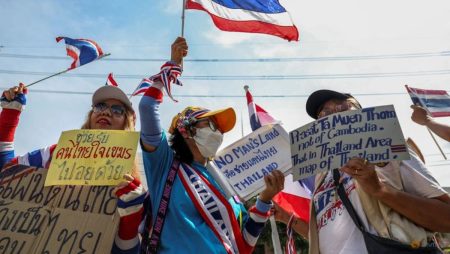The alleged kidnapping of a Chinese national in Thailand, widely publicized on social media, has triggered a wave of fear and distrust among Chinese tourists, resulting in a significant downturn in the Thai tourism industry. Thousands of flights and hotel bookings have been cancelled, impacting one of the most profitable travel periods, the Chinese New Year. This incident has not only affected individual travel plans but has also caused large-scale cancellations, including chartered flights and even a concert by a prominent Hong Kong singer. The fear stemming from this incident has cast a pall over the perception of safety in Thailand among Chinese travelers, leading to a noticeable drop in tourism revenue and raising concerns about the long-term impact on the industry.
The case of the alleged kidnapping, while specific in its details, has amplified pre-existing anxieties about safety in Southeast Asia, particularly among Chinese tourists. These concerns have found a fertile ground on social media platforms like Xiaohongshu and Douyin, where personal accounts, warnings, and cautionary advice have proliferated. The widespread sharing of these narratives has contributed to a generalized perception of danger, painting a picture of Thailand, and to some extent neighboring countries like Cambodia and Malaysia, as risky destinations. This online amplification of fear has exacerbated the impact of the individual incident, creating a broader chilling effect on travel plans and potentially damaging the reputation of the region as a safe and welcoming tourist destination.
The narrative surrounding the alleged kidnapping has been further fueled by the involvement of prominent figures within the Chinese community, both in Thailand and China itself. Chu Cancan, a Chinese national residing in Phuket and known online as “Teacher Can Can,” has been particularly vocal, using his platform to urge Chinese nationals in Thailand to speak out about the incident. His video message, widely circulated on platforms like Xiaohongshu and WeChat, added another layer of urgency and concern, further solidifying the narrative of danger and prompting calls for increased vigilance and awareness among Chinese travelers. This personalized call to action, coming from a respected figure within the community, resonated deeply and contributed significantly to the spread of anxiety and apprehension.
The incident and its subsequent fallout highlight the powerful role social media plays in shaping public perception and influencing travel decisions. The rapid spread of information, coupled with personal anecdotes and often unsubstantiated claims, can create a climate of fear and distrust that can significantly impact entire industries, particularly tourism. While the alleged kidnapping is undoubtedly a serious matter requiring investigation and appropriate action, the widespread panic it has generated underscores the potential for isolated incidents to be amplified and generalized, leading to disproportionate consequences for the affected regions. This case serves as a stark reminder of the need for careful and balanced reporting, especially in the age of social media, to avoid unnecessary alarm and prevent undue damage to economies reliant on tourism.
The economic repercussions of this incident are already being felt in the Thai tourism sector. The cancellation of thousands of flights and hotel bookings represents a significant financial blow, particularly during the crucial Chinese New Year period. The loss of revenue not only affects airlines and hotels but also impacts a wide range of businesses that rely on tourism, from restaurants and souvenir shops to local tour operators and transportation services. The long-term impact remains uncertain, but the incident has undoubtedly created a negative image of Thailand in the minds of many Chinese travelers, potentially leading to a sustained decline in tourism revenue and a slower recovery for the affected businesses.
Beyond the immediate economic impact, the incident raises broader questions about safety, security, and the perception of risk in Southeast Asia. While the specifics of the alleged kidnapping are still under investigation, the resulting fear and anxiety highlight the importance of addressing underlying concerns about security and ensuring the safety of tourists. Building trust and restoring confidence in the region will require a concerted effort from governments and tourism authorities to implement effective security measures, enhance communication, and actively counter misinformation that can fuel fear and discourage travel. The long-term recovery of the tourism sector will depend on effectively addressing these concerns and rebuilding a positive image of the region as a safe and desirable destination.










